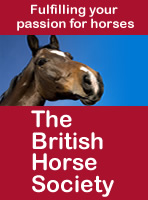
Horseytalk.net/Hoofbeat EXCLUSIVE
RIDER RIGHTS

Conservation Grazing vs Public Access
Can Access ever win?
- Since 2007, 51 applications to fence commons have been processed, and 49 have been granted
- There is a quasi-religious belief amongst the professional conservation community that a common can be restored to a former impoverished state by putting up a fence and turning out a bunch of half-starved animals to find what they can to eat
- In terms of conservation, this ‘one size fits all’ attitude of Natural England and their co-religionists, the Wildlife Trusts, needs serious re-examination.
- In terms of the Planning Inspectorate, there needs to be a far more balanced examination of fencing applications, guidance to inspectors that fencing is absolutely a last resort for commons management, and that it should not be implemented in such a way as to interfere with public access of any legitimate user....At the moment it appears that any information or opinion proffered by Natural England or its cohorts is ‘evidence’ and anything presented by objectors is ‘no evidence’
- There should be an accessible (ie, not excessively expensive) process of appeal against Planning Inspectorate decisions on commons
- The apparently endless stream of funding for fencing should be severely curtailed
Says Sandra Smith
 Facing an unwelcome application to fence and graze your local common? Nervously anticipating a Public Inquiry? Think you can win? Think again !
Facing an unwelcome application to fence and graze your local common? Nervously anticipating a Public Inquiry? Think you can win? Think again !
Fencing of commons is allowed under the Commons Act 2006, most often for conservation grazing and frequently on SSSI’s. An application has to be made to the Secretary of State for the Environment (DEFRA) but they send it straight off to the Planning Inspectorate to deal with.
Since 2007, 51 applications to fence commons have been processed, and 49 have been granted. In the light of these numbers, the recent comment from Richard Hepburn (DEFRA)to Maureen Comber that ‘I am afraid that I do not agree with your assertion that the Planning Inspectorate are “rubber stamping” applications'’ is extremely difficult to accept, and one has to consider what it does take to get an application refused.
The first refused application was Kingwood Common in Oxfordshire in 2011. This common had the good sense to be protected from enclosure by its own Act of Parliament (The Nettlebed and
District Commons (Preservation) Act) which states "Any part of the commons set apart by the Conservators for any purpose may be closed and exclusively appropriated by the Conservators for any period or periods not exceeding twenty-one days in any one year and for not more than four consecutive days on any one occasion…”
As the application was for a period of fifteen years (slightly more than twenty-one days) even the Planning Inspector had to agree with the objectors that the common could not be legally fenced, and the application was refused.
The second refused application was for Telscombe Tye in Easy Sussex in 2012. This application contained a multitude of discrepancies, inaccuracies and ambiguities, and was not granted. These comments of this Inspector may be useful to other proposed victims of fencing:
46. However, what I cannot accept (simply because I have not seen the evidence to support it) is that fencing the whole of the E-piece between Bridleway 6 and Gorham Lane as proposed in the application will necessarily result in the improvement of the nature conservation interest in the common.
47. I recognise that that is the intention. I also recognise that it is probably possible. But the plan setting out the steps to lead from the present situation to the agreed improvement and showing how the proposed fencing is an essential element in that action plan has not been submitted.
Her comments below also show a welcome, albeit rare to the point of extinction, deviation from the normal rubber stamped approvals:
41. It was acknowledged that sheep alone will not solve the problem; there will be a need to clear the scrub either by hand and/or by mechanical means. Further, the applicant is considering using Exmoor ponies to graze the area, yet Mrs Rowland, Lady Akenhead and Mrs Baverstock (all horse riders themselves) highlighted some of the potential difficulties which might suggest that this is not the panacea anticipated by some.
Horse riders will be well aware of the problems which can be caused by loose ponies and maybe now that this has been accepted by one inspector, there is a better chance of getting others to take notice in their decisions.
Apart from these two decisions, all others seem to be granted by the Planning Inspectorate, provided that the magic word ‘conservation’ is included in the incantation. There is a quasi-religious belief amongst the professional conservation community that a common can be restored to a former impoverished state (brought about by tree felling, wood gathering, peat cutting, bracken and heather harvesting, rabbit and deer shooting, and burning) by putting up a fence and turning out a bunch of half-starved animals to find what they can to eat. As any farmer knows, once you use land for grazing, all other interests have to become subservient to the needs of the animals. They have to be securely constrained from straying, protected from dogs, given access to shelter and water, and visited (by ‘rangers’ driving 4x4’s across delicate paths in all weathers and spoiling them for other users). Hence – all access points have to be fenced or gated, the gates have to self-close, dogs have to be kept on a lead and so on. Former open spaces become enclosed land and many former users are deterred or physically prevented (especially in the case of disabled users and horse riders) from using the land.
What needs to change?
In terms of conservation, this ‘one size fits all’ attitude of Natural England and their co-religionists, the Wildlife Trusts, needs serious re-examination. Grazing is what they insist on, because they can’t think what else to do, but it doesn’t bring about any benefit commensurate with the access curtailments resulting. All the while that Natural England mandate grazing as a condition of receiving HLS payments on commons, fencing and loss of access will be the result. Conservation plans need to be far more closely tailored to the individual needs and history of each common. ‘Copy and paste’ seems to have a lot to answer for in this respect.
In terms of the Planning Inspectorate, there needs to be a far more balanced examination of fencing applications, guidance to inspectors that fencing is absolutely a last resort for commons management, and that it should not be implemented in such a way as to interfere with public access of any legitimate user. Inspectors should be instructed not to elevate the credibility of Natural England above that of other witnesses simply because they are a quango; rather, they should demand a more rigorous quality of evidence from applicants that from objectors. The Planning Inspectorate should also document and share its view on what constitutes ‘evidence’ in a hearing or inquiry.
At the moment it appears that any information or opinion proffered by Natural England or its cohorts is ‘evidence’ and anything presented by objectors is ‘no evidence’. Thus, in the case of Chobham Common in 2012, the statement by Isabel Alonso of Natural England that ‘everyone knows that grazing works’ was accepted as evidence, but the presentations and statements by objectors and their professional witnesses, about proven alternative methods of management, were dismissed, as was the British Horse Society evidence about reported and documented accidents involving gates and horses.
Lastly, there should be an accessible (ie, not excessively expensive) process of appeal against Planning Inspectorate decisions on commons. At the moment, the only appeal is a judicial review, which only allows the decision to be reviewed in terms of its legality. There is no appeal against a wrong conclusion or decision, wrong judgement, absolute bias, or just a bad hair day on the part of the Inspector. Surely, for decisions which affect the lives of so many people, that can’t be just.
Lastly, the apparently endless stream of funding for fencing should be severely curtailed. This generally comes straight from CAP II funds and we know how Brussels have refused to get involved in the budget cuts that the rest of us are having to live with. Perhaps terminating this stream of money would not only discourage Natural England from interfering with our commons, but also free them from the anxiety of continually rewriting the HLS section about non-eligibility of government departments and non-departmental government organizations. With so many of these benefiting from HLS via third parties like Wildlife Trusts, Councils and professional conservations agents, I’d be in daily fear of a knock on the door from the Fraud Squad. We will have to see what we can do !







